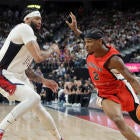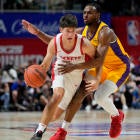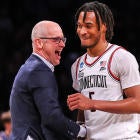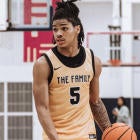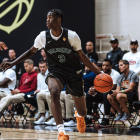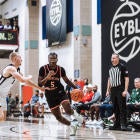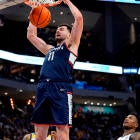It's been two weeks since the NCAA announced it would not sanction North Carolina even though its student-athletes benefitted from fraudulent classes for nearly two decades. But if you thought the collegiate sports governing body was going to take this month off completely, think again. Because there are basketball players at Oakland and Colorado who must be punished -- even if it fails to pass the test of common sense and decency.
Yep, here we are again.
One player is named Jalen Hayes. The other is Evan Battey.
Let me tell you their stories.
I'll start with Hayes -- the 6-foot-7 senior who averaged 15.9 points and 8.0 rebounds for an Oakland team that won 25 games last season. He's a human resources development major who is on track to graduate in December. And yet the NCAA ruled him academically ineligible for the fall semester because, according to NCAA rules, he "failed to make satisfactory progress toward a degree." Again, Hayes is on track to graduate in December of his senior season. But the NCAA's rules, as written, insist he's not making "satisfactory progress toward a degree."
(Think about that for a second.)
The issue is that Hayes received a 2.5 grade in a class in the spring, which led to Oakland not giving him credit for the class because Oakland requires students to have at least a 2.8 in Hayes' major. And when Hayes failed to earn that credit, he dropped below the 18 hours the NCAA requires student-athletes to complete between the start of fall classes and spring commencement. So the NCAA ruled him ineligible -- essentially because Oakland, unlike some universities, actually holds its student-athletes to real standards.
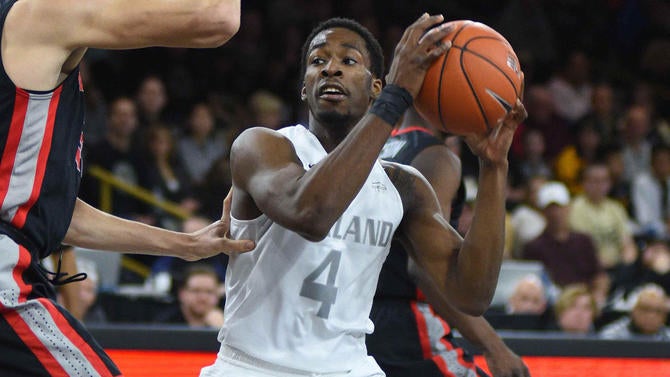
Naturally, Oakland appealed to the NCAA. Its argument was simple and basically that it's ridiculous to rule Hayes ineligible for "failing to make satisfactory progress toward a degree" when he is actually progressing so well he's on track to graduate in December of his senior season with a 2.9 GPA. The NCAA heard the appeal and dropped the suspension to four games, which is better. But what sense does it make to punish a player at all, for any games, who chose to pursue a real major, and is about to graduate, simply because he got caught by a technicality that obviously shouldn't apply to him?
Answer: It makes no sense whatsoever.
Oakland coach Greg Kampe told CBS Sports on Friday that the school has "asked for reconsideration." But, Kampe said, the NCAA has refused to reconsider its ruling. So Hayes will miss Oakland's first four games -- among them a Nov. 20 game at Syracuse.
"Jalen got tripped up by the high standards at Oakland, but that doesn't mean he hasn't made satisfactory progress toward his degree," Kampe told CBS Sports. "He's going to get his degree in December. So we don't get it. It makes no sense to not let him play. He's a senior. These are his last-chance games."
So that's the story of Jalen Hayes.
Total insanity.
And, believe it or not, Evan Battey's story is maybe even more ridiculous.
"It's a little bit ironic to me with all the things that are going on in college basketball," Colorado coach Tad Boyle told reporters Thursday when he announced Battey has been ruled ineligible to compete as a freshman. "North Carolina academic scandal, they lawyer up and fight the NCAA for two years, and they win on a technicality. They get off scot-free. There's an FBI investigation going on. There's four assistant coaches that have been arrested by the FBI. As of today, nothing has happened to those four schools. No ramifications for those sorts of things. But you have a kid who struggled a little bit when he was 13 years old in the classroom due to a lot of personal and family issues he was dealing with at the time, and he gets stuck sitting out this year."
As Boyle alluded, Battey needed five years to complete high school -- not because he goofed-off as a senior, skipped classes or anything like that, but because he struggled literally five years ago, at the age of 13, and had to repeat ninth grade. Over time, and with better guidance, the 6-6 forward developed into somebody Boyle said is "probably more ready academically and athletically to play" as a freshman than any other player he's ever coached. And yet the NCAA declared Battey ineligible, and then denied Colorado's waiver, because he failed ninth grade five years ago, and NCAA rules state that a player must graduate high school in four years if he wants to compete as a freshman.
"Evan Battey gets punished and North Carolina gets off scot-free," Boyle said. "I'm not sure where the justice is in that. That's for other people to decide. But I'm extremely disappointed."
As he should be.
I'll make this simple: The NCAA has a waiver process for a reason, and it should always be used with common-sense and decency. I'm not sure how anybody could disagree with that sentence. And yet there's nothing decent or sensible about the way the NCAA handled the cases of Jalen Hayes and Evan Battey.
Both should be playing on opening night.
But neither will.
And that's wrong, wrong, wrong.
Bottom line, when you have a system that allows you to punish Hayes and Battey for no good reason but prevents you from sanctioning North Carolina for what some have called the biggest academic fraud case in history, your system is goofy. That's the long and short of it. And if the NCAA can't handle academic cases any better than this, it should maybe do what I've long suggested might be the smartest move and just get out of the academic eligibility business entirely. If the NCAA is going to trust North Carolina and every other school to decide which classes are OK and which classes are not OK, why not also let North Carolina and every other school decide which student-athletes can play and not play?
Let Stanford enroll and play whomever it wants.
Let Southern Miss enroll and play whomever it wants.
Honestly, what would be the downside of that system? It's a system that would eliminate the temptation for systemic academic fraud among student-athletes because there would be no need to cheat to keep a player academically eligible because a player would only be academically ineligible if his school decided to label him that way. And, more to the point, it would prevent players like Jalen Hayes and Evan Battey from missing playing time for reasons that can't possibly make any sense to any sensible person.









